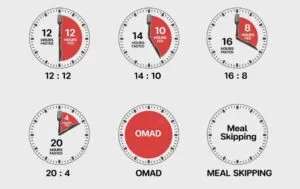
Intermittent fasting has gained popularity not just as a weight-loss strategy but also for its numerous health benefits. Among these, the heart benefits are particularly noteworthy. As heart disease remains one of the leading causes of mortality worldwide, finding effective ways to promote heart health is crucial. Let’s explore how fasting can play a role in enhancing cardiovascular health.
Table of Contents
Understanding Intermittent Fasting
Intermittent fasting (IF) involves cycling between periods of eating and fasting. Common protocols include the 16/8 method, where you fast for 16 hours and eat during an 8-hour window, and the 5:2 method, which allows normal eating for five days and restricts calories for two days. These practices not only promote weight loss but can also initiate several metabolic changes that benefit the heart. Instead of rushing into a protocol, I recommend starting slowly, such as moving up dinner a few hours so there is more time between dinner and breakfast. Once you are comfortable, you can continue increasing the fasting time.
Key Heart Benefits of Intermittent Fasting
- Improved Blood Pressure: Several studies suggest that fasting may help lower blood pressure, a significant risk factor for heart disease. By reducing calorie intake and promoting weight loss, fasting can help alleviate pressure on the arterial walls, leading to better overall cardiovascular health.
- Reduced Inflammation: Chronic inflammation is linked to cardiovascular diseases. Intermittent fasting can reduce markers of inflammation, such as C-reactive protein (CRP). Lower inflammation levels can protect against conditions like atherosclerosis and heart attacks.
- Better Cholesterol Levels: Research indicates that IF can improve lipid profiles, including lowering LDL (bad cholesterol) and triglycerides while raising HDL (good cholesterol). A healthier cholesterol balance plays a crucial role in preventing plaque buildup in arteries.
- Enhanced Blood Sugar Control: Fasting helps improve insulin sensitivity and lowers blood sugar levels. By stabilizing glucose levels, it reduces the risk of type 2 diabetes, a significant risk factor for cardiovascular disease. Better blood sugar control translates to lower risks of heart-related issues. Hemoglobin A1c are lower in fasting groups.
- Weight Management: Excess body weight is a well-known risk factor for heart disease. Intermittent fasting can lead to weight loss and help maintain a healthy weight over time, ultimately benefiting heart health by reducing the strain on the cardiovascular system.
- Boosted Heart Function: Some studies have shown that intermittent fasting can enhance heart function by promoting autophagy, a process that removes damaged cells and regenerates healthy ones. This cellular “clean-up” can improve heart efficiency.
- Stress Reduction: Fasting can help lower oxidative stress levels in the body. By reducing oxidative stress, intermittent fasting may protect against cellular damage and aging, ultimately benefiting heart health.
Getting Started with Intermittent Fasting
If you’re considering incorporating fasting into your routine for heart health, here are a few tips to get started:
- Choose a Method That Fits Your Lifestyle: Whether it’s the 16/8 or another method, select an approach that works for your schedule and preferences.
- Maintain a Balanced Diet: While fasting, it’s essential to focus on nutrient-dense foods during eating windows. Include plenty of fruits, vegetables, whole grains, lean proteins, and healthy fats.
- Stay Hydrated: Drink plenty of water during fasting periods to stay hydrated and support overall health.
- Listen to Your Body: Pay attention to how you feel. If you experience adverse effects, consider adjusting your fasting method or consult a healthcare professional.
Conclusion
Intermittent fasting is more than a trend; it’s an approach that holds promise for enhancing heart health. From better blood pressure and cholesterol levels to reduced inflammation and improved metabolic markers, the potential benefits are significant. However, as with any dietary change, it’s wise to consult with a healthcare professional, especially if you have pre-existing health conditions. Embracing time-restricted eating could be a valuable step toward a healthier heart and a longer, healthier life.
Reference:

